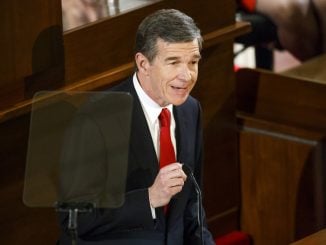
RALEIGH — Roy Cooper has been re-elected as North Carolina’s governor, with the Democratic incumbent beating Republican challenger and current Lt. Gov. Dan Forest.
Unofficial results showed Cooper with a 250,000-vote advantage, taking over 51% of the vote to Forest’s 47%.
The race was widely considered a referendum on Cooper’s handling of the COVID-19 pandemic in North Carolina, with the governor garnering criticism for being too slow to reopen the state.
Ultimately, three advantages proved too much for Forest to overcome: incumbency, COVID press conferences and money.
Cooper raised over $36 million over the course of his campaign, more than doubling the total in his 2016 campaign when he defeated then-incumbent Gov. Pat McCrory. In addition to that astonishing amount, the Cooper-controlled N.C. Democratic Leadership Committee contributed an additional $9.7 million. Forest, meanwhile, only raised a total of around $10 million for his campaign.
The fundraising apparatus allowed Cooper to blanket the airwaves with TV ads in addition to his COVID-19 updates that were often broadcast statewide.
Since March, Cooper, N.C. Department of Health and Human Services Secretary Mandy Cohen, and N.C. Emergency Management Director Mike Sprayberry have become the public face of the state’s response to the pandemic. Throughout the spring and summer, they have made extensive use of the state’s Emergency Operations Center in Raleigh to provide public health updates and announce executive orders aimed at slowing the virus’ spread.
Governors across the nation took on similar roles in their respective states, although North Carolina was one of the few states with the governor on the ballot during the pandemic. Cooper garnered praise from some corners and fierce opposition from groups like ReOpenNC.
Forest sought to highlight the devastating impact of Cooper’s executive orders that locked the state down in the spring and reopened parts of the economy much more slowly than neighboring states like South Carolina, Georgia and Florida.
Cooper also faced criticism for the backlog of unemployment benefits being paid out, leading to the replacement of N.C. Division of Employment Services Lockhart Taylor with former N.C. House Rep. Pryor Gibson.
Still, Cooper prevailed, and campaign spokeswoman Liz Doherty said, “Tonight’s decisive victory sends the message loud and clear — North Carolinians trust Roy Cooper to put them first. North Carolinians rejected Dan Forest’s campaign of fear and division and dangerous lies and opted instead for steady, decisive, and compassionate leadership.”
Republicans again failing to capture the governorship makes former Charlotte mayor Pat McCrory the only Republican to have won the office since the two terms of former Gov. Jim Martin from 1984-1992.
Forest said of the defeat, “My heart is heavy today, but the sun still rose once again this morning and a new day dawned. Our family has been honored to serve the people of this great state for the past eight years and now a new journey begins.”
During a radio appearance with KC O’Dea the day after Election Day, Forest said he would not seek the governorship in 2024.
While victorious, Cooper once again will battle with a Republican-led General Assembly for at least the next two years. He vetoed every state budget presented to him in his first term, leaving the state to operate without an adopted budget since July of 2019.
One of Cooper’s stated priorities, Medicaid expansion, will likely continue to receive a chilly reception on Jones Street. Many of Cooper’s TV ads focused on the issue, often citing a line saying 39 states had expanded the program, including Indiana when Vice President Mike Pence was governor. Indications from Senate Leader Phil Berger and House Speaker Tim Moore are that they will continue to oppose expanding the program.
Other issues Cooper will confront are education and the state’s economic recovery from COVID-19.
Cooper initially forbade the return of full-time in-person instruction in July but relented in September, allowing K-5 schools the option to return to classrooms. He has called for teacher raises in the state budget but vetoed budgets which included raises, claiming that they weren’t sufficient. Cooper has also called the elimination of the state’s Opportunity Scholarships program that has been a priority for the Republican-led General Assembly.
At the first media availability following the election, Cooper called for the White House and Congress to negotiate a new stimulus package to aid states. He previously established state grant programs for businesses and seems to favor a government-led effort to keep businesses from closing.
Cooper is forbidden from seeking a third consecutive term, but will have four more years to enact his priorities.



